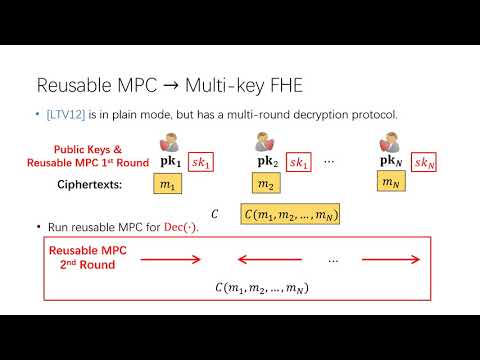CryptoDB
Multi-key Fully-Homomorphic Encryption in the Plain Model
| Authors: | |
|---|---|
| Download: | |
| Presentation: | Slides |
| Abstract: | The notion of multi-key fully homomorphic encryption (multi-key FHE) [Lopez-Alt, Tromer, Vaikuntanathan, STOC'12] was proposed as a generalization of fully homomorphic encryption to the multiparty setting. In a multi-key FHE scheme for $n$ parties, each party can individually choose a key pair and use it to encrypt its own private input. Given n ciphertexts computed in this manner, the parties can homomorphically evaluate a circuit C over them to obtain a new ciphertext containing the output of C, which can then be decrypted via a decryption protocol. The key efficiency property is that the size of the (evaluated) ciphertext is independent of the size of the circuit. Multi-key FHE with one-round decryption [Mukherjee and Wichs, Eurocrypt'16], has found several powerful applications in cryptography over the past few years. However, an important drawback of all such known schemes is that they require a trusted setup. In this work, we address the problem of constructing multi-key FHE in the plain model. We obtain the following results: - A multi-key FHE scheme with one-round decryption based on the hardness of learning with errors (LWE), ring LWE, and decisional small polynomial ratio (DSPR) problems. - A variant of multi-key FHE where we relax the decryption algorithm to be non-compact -- i.e., where the decryption complexity can depend on the size of C -- based on the hardness of LWE. We call this variant multi-homomorphic encryption (MHE). We observe that MHE is already sufficient for some of the applications of multi-key FHE. |
Video from TCC 2020
BibTeX
@article{tcc-2020-30631,
title={Multi-key Fully-Homomorphic Encryption in the Plain Model},
booktitle={Theory of Cryptography},
publisher={Springer},
author={Prabhanjan Ananth and Abhishek Jain and Zhengzhong Jin and Giulio Malavolta},
year=2020
}

